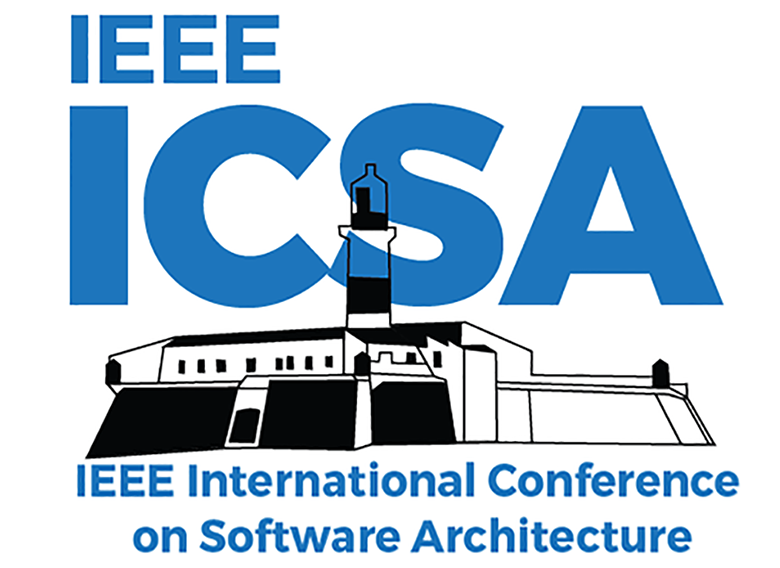Download the ICSA Flyer here.
The IEEE International Conference on Software Architecture (ICSA 2020) is the premier gathering of practitioners and researchers interested in software architecture, in component-based software engineering and in quality aspects of complex software systems.
ICSA continues the tradition of a working conference, where researchers meet practitioners and where software architects can explain the problems they face in their day-to-day work and try to influence the future of the field. Interactive working sessions will be the place where researchers meet practitioners to identify opportunities to create the future.
A software system’s architecture comprises the principal design decisions employed in the system’s construction and evolution. It is the primary determinant of the system’s key properties. Put simply, software systems “live and die” by their architectures. Hugely successful software solutions (e.g., the well known client-server, peer-to-peer, and map-reduce systems, and even the Web itself) are successful because of their architectures first and foremost. Although every system has an architecture, the architectures of many systems are not explicitly documented; instead those architectures are reflected (actually, hidden) in the systems’ implementations, posing significant challenges to studying the architecture of real-world software systems in a systematic, empirical fashion. The theme of ICSA 2020 is “Empirical Software Architecture Research”; we call on both researchers and practitioners for contributions that advance our understanding of architectures in real-world software, facilitate empirical research by making architectural artifacts and tools available publicly, and promote replicability of results through common datasets and benchmarks.
We welcome original papers that explore and explain the role of architecture in current systems and future systems. This conference looks at what can be learned from our software architecture history, experience, studies, and best practices.
Important Dates
- Abstracts due: Dec 11, 2019
- Full papers due: Dec 18, 2019 - AoE (Anywhere on Earth)
- Notification of acceptance: Feb 01, 2020
- Camera-ready due:
Feb 10, 2020February 21th, 2020
Submission
We solicit the software architecture community the submission of:
- Technical research papers that describe original and significant results of theoretical, empirical, conceptual, or experimental work in software architecture research or industrial practice. The novelty of the contribution needs to be clearly described and the results validated. All submissions must conform to the ICSA 2020 formatting and submission instructions and must not exceed 10 pages for the main text, inclusive of all figures, tables, appendices, etc. Two more pages containing only references are permitted. The submissions will be evaluated based on soundness, significance, verifiability, and presentation quality, in that order.
Please note that ICSA 2020 will pursue a double-blind review process for the main Technical track (only), therefore all submissions to this track have to fulfill the double-blind reviewing requirements. Papers submitted to the ICSA 2020 technical track that disregard these review requirements will not be reviewed but desk-rejected.
All submissions must conform to the Author Instructions.
All papers are to be submitted electronically via the EasyChair submission system by the submission deadline, and must not have been published before.
All accepted contributions will be published in ICSA 2020 proceedings, and appear in IEEE Xplore Digital Library. At least one author of an accepted contribution is required to register and present the work at the conference.
Topics
Topics of interest for the conference include (but are not limited to) the following themes:
- Architecture & CI/CD, DevOps, Containerization, Serverless platforms
- Microservices and event-driven architectures
- Model driven engineering for continuous architecting
- Up-front architecture and agile development
- Architecting Systems of Systems, IoT systems, CPSs, software ecosystems, self-adaptive systems, or autonomous systems
- Component based software engineering
- Architecture evaluation and quality aspects of software architectures
- Automatic extraction and generation of software architecture descriptions
- Refactoring and evolving architecture design decisions and solutions
- Architecture frameworks and architecture description languages
- Linking architecture to requirements and/or implementation
- Architecture conformance
- Reusable architectural solutions
- Software architecture knowledge management
- Software architecture for legacy systems and systems integration
- Architecting families of products
- Cultural, economic, business and managerial aspects of software architecture
- Software architects roles and responsibilities
- Training, education, and certification of software architects
- State-of-the-art and state-of-practice in software architecture
- Industrial experiments and case studies
Anonymization, Formatting and Submission Instructions
Please note that ICSA 2020 will pursue a double-blind review process for the main Technical track (only), therefore all submissions to this track have to fulfill the double-blind reviewing requirements. Papers submitted to the ICSA 2020 technical track that disregard these review requirements will not be reviewed but desk-rejected.
All submissions must conform to the Author Instructions.
All papers are to be submitted electronically via the EasyChair submission system (the link will be available soon) by the submission deadline, and must not have been published before.
Publication
All accepted contributions will be published in ICSA 2020 proceedings, and appear in IEEE Xplore Digital Library. At least one author of an accepted contribution is required to register and present the work at the conference.
Organization
For more information please contact the program chairs through the Easychair address: icsa2020@easychair.org.
- Sam Malek (University of California, Irvine)
- Alessandro Garcia (Pontifícia Universidade Católica do Rio de Janeiro, Brazil)
- Paulo Merson (Brazilian Federal Court of Accounts)
